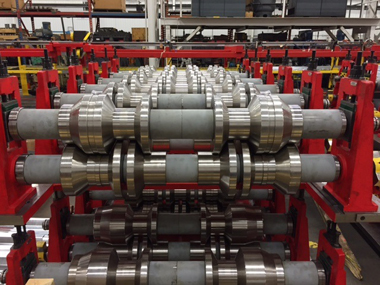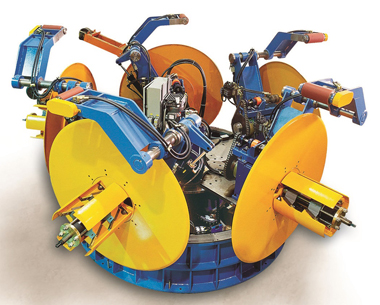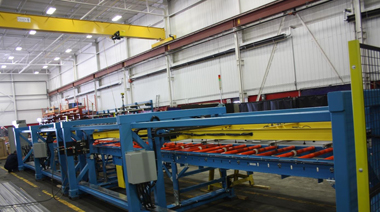 By Jaswinder Bhatti, Samco Machinery
By Jaswinder Bhatti, Samco Machinery
Those who depend on roll formers for their livelihood expect a lot from their roll forming line. They want it to do more, be more versatile and they want it faster. It’s not always easy, but that’s the goal when a customer requests or demands
improvements.
So far, the industry has been able to meet the demands of customers for their roofing and wall panel roll forming machines. The industry has introduced innovations to help improve productivity, reduce downtime and reduce labor input.
Quick-Changes
 |
Roll former. |
Machine versatility came about when customers wanted different features in their roofing and wall panels. It would be easy if every customer wanted the exact same panel, but they don’t. They want different profiles, different colors, different widths,
different yield strengths and different lengths. It’s not practical to have four or five or six roll formers, but it’s become reasonable to expect one machine to offer enough options to satisfy a good percentage of the customers’
requirements.
Engaging different rolls has become a simple step in the roll forming process. If the requirement is for a standing seam roofing panel to have ribs, it takes a simple adjustment to the rollers to create ribs during the forming process. It’s a matter
of turning it on or off. All of this info can be entered from a single control panel; a control panel that is connected to the entire line.
Running a different profile with the same machine can also be accomplished with double-high, side-by-side operations or rafted tooling.
 |
Five-head uncoiler. |
Forming a panel with a new color requires a different coil. Once a time-consuming process that could lead to a lot of material waste now is simplified by the use of multiple uncoilers. Uncoilers at the front end of the roll former can hold multiple coils
to reduce changeover times.
To minimize material waste, shears have been incorporated into the front end of the machine. Front-end shears cut the material before it goes through any part of the roll forming process. If you can only shear at the end of the line, the material on the
line becomes waste when you package what you need.
Organizing For The Jobsite
Time is money in the shop and time is money at the jobsite as well. Organizing the bundles of product, either roofing or wall panels, in a manner that allows the installer to unpack them in the order they are to be installed can be a logistical nightmare
if you’re to do it manually. The process can be greatly simplified with an automated pick-and-place system.
 |
Pick-and-place system. |
When the panels arrive at the jobsite, they are bundled to suit the installer. The first panel off the stack is the first installed, the second panel off the stack is the second installed. It saves a lot of headaches at the jobsite.
The various machines in a modern roll forming line receive instructions by programming and can adjust almost on the fly. Operators don’t need to input information. This saves time and assures accuracy and efficiency.
Samco Machinery designs each roll forming machine with a specific customer in mind. Each roll forming line is unique and can offer the most efficient innovations available, to save time and money … through improved machine efficiencies to greatly
reduce downtime and reduce labor costs.